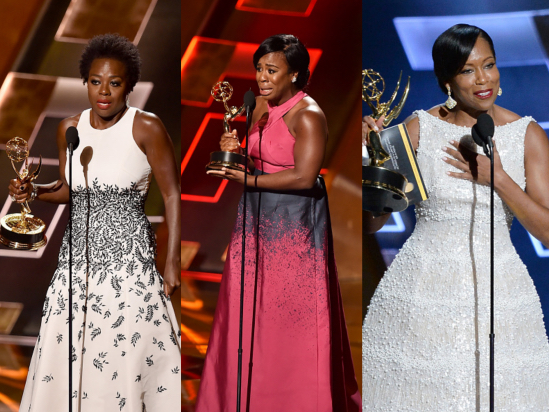
How this year’s Emmys kicked open the door to diversity
The red carpet’s been rolled up and the blistered heels have been bandaged as another year of Emmys has come and gone. But this year, there was a significant shift in the conversation as the emphasis on mani-cams and fashion designers were sidelined for a more important dialogue: diversity onscreen.
#Emmys diversity maybe has a bit further to go… pic.twitter.com/3tRf7QKGXD
— Rachel Sklar ❄️ (@rachelsklar) September 21, 2015
This year’s awards night marked a significant milestone for diversity in an industry notorious for its whitewashed uniformity. Considering colour TV has been in existence since 1940, we certainly don’t see much other than white in Hollywood.
Andy Samberg even joked about it in his opening monologue.


This year’s awards were pretty significant for showcasing the talents of women of colour whose performances are generally cast as a token, sidekick, or stereotype. In a span of almost seven decades, Viola Davis was the first black woman to ever win Best Leading Actress in the history of the awards night for her role in How to Get Away with Murder. In one quote, she nailed Hollywood’s race problem on the head:
“You cannot win an Emmy for roles that are simply not there.”

I’m not crying, you are.
Her powerful speech resonated far beyond the walls of the film industry, in a statement that encompasses many facets of a society steeped in institutionalised racism. The issue has never been that there aren’t enough people of colour to fill up roles in Hollywood, or that there aren’t enough coloured roles out there; it’s that the industry chooses not to make space for them.
.@Polgpolly #Emmys @moworldwide #SmartGirlsAsk pic.twitter.com/IAl68jgRiz
— AmyPoehlerSmartGirls (@smrtgrls) September 20, 2015
Uzo Aduba also broke records being the first female to win the award for Best Supporting Actress two years in a row for playing the same role but in two different categories – Comedy and Drama – for Orange is the New Black. The OITNB team have been lauded ever since the show kicked off for its diverse casting of unknown actors, giving opportunities to actresses who, as Davis pointed out, wouldn’t have been given as many opportunities.

The inclusion of some kick ass leading ladies who fall outside the spectrum of women in shampoo ads is a huge celebration of the push for diversity. These accolades open the door wider for more representation onscreen, whether that be regarding, race, gender, size, or sexuality. Thanks to hashtags like #AskHerMore and #SmartGirlsAsk pushing the discussion away from the usual casual sexism women receive on the red carpet, leading ladies were given the opportunity to speak out on issues they cared about.
.@324_B21 #Emmys @hereisgina #SmartGirlsAsk pic.twitter.com/FVO8GQp5Ru
— AmyPoehlerSmartGirls (@smrtgrls) September 20, 2015
Because when you give women a chance to talk, they have so much more to say than the tag on their dress.
